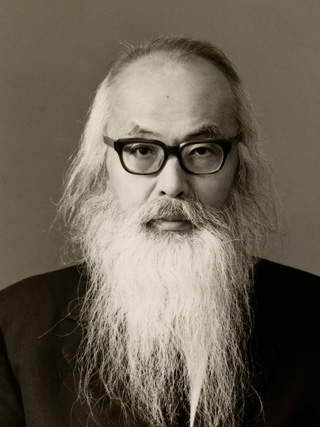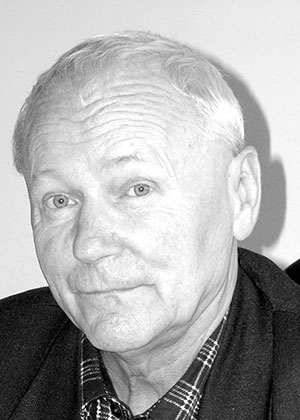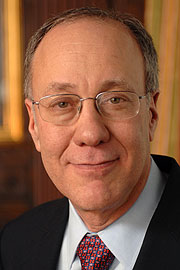
Kenneth Joseph Arrow was an American economist, mathematician, writer, and political theorist. Along with John Hicks, he won the Nobel Memorial Prize in Economic Sciences in 1972.

Gérard Debreu was a French-born economist and mathematician. Best known as a professor of economics at the University of California, Berkeley, where he began work in 1962, he won the 1983 Nobel Memorial Prize in Economic Sciences.

Sir Clive William John Granger was a British econometrician known for his contributions to nonlinear time series analysis. He taught in Britain, at the University of Nottingham and in the United States, at the University of California, San Diego. Granger was awarded the Nobel Memorial Prize in Economic Sciences in 2003 in recognition of the contributions that he and his co-winner, Robert F. Engle, had made to the analysis of time series data. This work fundamentally changed the way in which economists analyse financial and macroeconomic data.

Hirofumi Uzawa was a Japanese economist.

Lars Peter Hansen is an American economist. He is the David Rockefeller Distinguished Service Professor in Economics, Statistics, and the Booth School of Business, at the University of Chicago and a 2013 recipient of the Nobel Memorial Prize in Economics.
Lionel Wilfred McKenzie was an American economist. He was the Wilson Professor Emeritus of Economics at the University of Rochester. He was born in Montezuma, Georgia. He completed undergraduate studies at Duke University in 1939 and subsequently moved to Oxford that year as a Rhodes Scholar. McKenzie worked with the Cowles Commission while it was in Chicago and served as an assistant professor at Duke from 1948 to 1957. Having received his Ph.D. at Princeton University in 1956, McKenzie moved to Rochester where he was responsible for the establishment of the graduate program in economics.

Auction theory is an applied branch of economics which deals with how bidders act in auctions and researches how the features of auctions incentivise predictable outcomes. Auction theory is a tool used to inform the design of real-world auctions. Sellers use auction theory to raise higher revenues while allowing buyers to procure at a lower cost. The conference of the price between the buyer and seller is an economic equilibrium. Auction theorists design rules for auctions to address issues which can lead to market failure. The design of these rulesets encourages optimal bidding strategies among a variety of informational settings. The 2020 Nobel Prize for Economics was awarded to Paul R. Milgrom and Robert B. Wilson “for improvements to auction theory and inventions of new auction formats.”

Leonid Hurwicz was a Polish–American economist and mathematician, known for his work in game theory and mechanism design. He originated the concept of incentive compatibility, and showed how desired outcomes can be achieved by using incentive compatible mechanism design. Hurwicz shared the 2007 Nobel Memorial Prize in Economic Sciences for his seminal work on mechanism design. Hurwicz was one of the oldest Nobel Laureates, having received the prize at the age of 90.

Eric Stark Maskin is an American economist and mathematician. He was jointly awarded the 2007 Nobel Memorial Prize in Economic Sciences with Leonid Hurwicz and Roger Myerson "for having laid the foundations of mechanism design theory". He is the Adams University Professor and Professor of Economics and Mathematics at Harvard University.
Henry Schultz was an American economist, statistician, and one of the founders of econometrics. Paul Samuelson named Schultz as one of the several "American saints in economics" born after 1860.
Robert Butler "Bob" Wilson, Jr. is an American economist and the Adams Distinguished Professor of Management, Emeritus at Stanford University. He was jointly awarded the 2020 Nobel Memorial Prize in Economic Sciences, together with his Stanford colleague and former student Paul R. Milgrom, "for improvements to auction theory and inventions of new auction formats". Two more of his students, Alvin E. Roth and Bengt Holmström, are also Nobel Laureates in their own right.

Alvin Eliot Roth is an American academic. He is the Craig and Susan McCaw professor of economics at Stanford University and the Gund professor of economics and business administration emeritus at Harvard University. He was President of the American Economic Association in 2017.

Designing Economic Mechanisms is a 2006 book by economists Leonid Hurwicz and Stanley Reiter. Hurwicz received the 2007 Nobel Memorial Prize in Economic Sciences with Eric Maskin and Roger Myerson for their work on mechanism design. In this book, Hurwicz and Reiter presented systematic methods for designing decentralized economic mechanisms whose performance attains specified goals.
Stanley Reiter was an American author, economist, and Emeritus Professor at Northwestern University. Reiter was a leading pioneer in the field of mechanism design.
Roger Guesnerie is an economist born in France in 1943. He is currently the Chaired Professor of Economic Theory and Social Organization of the Collège de France, Director of Studies at the École des hautes études en sciences sociales, and the chairman of the board of directors of the Paris School of Economics.

Arunava Sen is a professor of economics at the Indian Statistical Institute. He works on Game Theory, Social Choice Theory, Mechanism Design, Voting and Auctions.
The Journal of Mathematical Economics is a bimonthly peer-reviewed academic journal of mathematical economics published by Elsevier. It covers work in economic theory that expresses economic ideas using formal mathematical reasoning. The journal was established in 1974, with Werner Hildenbrand as the founding editor-in-chief. The current editor-in-chief is Andres Carvajal. According to the Journal Citation Reports, the journal has a 2018 5-year impact factor of 0.725.
Hervé Moulin is a French mathematician who is the Donald J. Robertson Chair of Economics at the Adam Smith Business School at the University of Glasgow. He is known for his research contributions in mathematical economics, in particular in the fields of mechanism design, social choice, game theory and fair division. He has written five books and over 100 peer-reviewed articles.

Vladimir Nikolaevich Burkov is a Russian control theorist and the author of more than four hundred publications on control problems, game theory, and combinatorial optimization. Laureate of State Prize of USSR, of Prize of Cabinet Council of USSR, he is an Honoured Scholar of the Russian Federation. Vladimir Burkov is a vice-president of Russian Project Management Association (SOVNET), Member of Russian Academy of Natural Sciences. A professor at Moscow Institute of Physics and Technology and Head of Laboratory at V.A. Trapeznikov Institute of Control Sciences of RAS, in the end of the 1960s he pioneered the theory of active systems.
Benny Moldovanu is a German economist who currently holds the Chair of Economic Theory II at the University of Bonn. His research focuses on applied game theory, auction theory, mechanism design, contests and matching theory, and voting theory. In 2004, Moldovanu was awarded the Gossen Prize for his contributions to auction theory and mechanism design.












